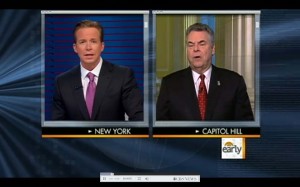Press Release, March 9, 2011
UNC Professor Identifies Mistakes in Congressman Peter King’s Comments
Press release issued by Charles Kurzman, University of North Carolina at Chapel Hill, March 9, 2011
Rep. Peter King, chairman of the House Committee on Homeland Security, has spoken to the media this week disparaging my study, “Muslim-American Terrorism Since 9/11: An Accounting.” His comments about the study included several inaccuracies that I would like to correct.
1. The study was not “skewed” and “biased,” as Congressman King claimed. It was the product of a good-faith, scholarly research project to list all Muslim-American terrorism suspects and perpetrators from September 12, 2001, to December 31, 2010. No cases were included or excluded on the basis of ideological criteria.
2. Congressman King is correct that the study excludes cases of terrorist financing. However, this decision was not politically motivated. Given limited resources, the study focused only on violent plots. I would be pleased to do a comparable study of terrorist financing cases if research funding is made available.
3. Congressman King was incorrect to suggest that the study identified Muslim-American community members as the initial source of tips on the plots by Najibullah Zazi and Faisal Shahzad. Rather, the study listed the British government as the initial source for the Zazi plot and no initial tip for Shahzad’s plot, which was not uncovered until he had already carried it out.
4. Congressman King was incorrect to suggest that family members are the primary source of tips on Muslim-American terrorism cases. The study found that 7 of the 48 tips that came from the Muslim-American community were from family members.
5. Congressman King was incorrect to claim that the study identified a decline in “the terrorist threat.” Rather, the study made the more modest claim that the spike in Muslim-American terrorism cases in 2009 was reversed in 2010.
The report and the full dataset are available for public review and analysis at http://www.unc.edu/~kurzman. [Updated link.]
Partial transcript of Congressman King’s comments on CBS’s Early Show, March 9, 2011:
Well, actually, I don’t accept those numbers. For instance, the percentages are made much higher because they left out a number of cases involving terrorist financing, which they did not include in there.
[Note: True — the study was not designed to include cases of terrorist financing. However, this focus was not politically motivated. Given limited resources, the study was focused only on violent plots.]I agree, there have been family members coming forward — it’s many times the leadership that doesn’t.
[Note: The study found that 7 of the 48 tips that came from the Muslim-American community were from family members. The study did not separate out community leaders from other community members as sources of initial tips.]Also they include cases in there — for instance, there’s this Zazi case in there, in New York, the subway bombing plot. When actually in that case the imam tipped off the defendant; the police were coming after him, and imam almost disrupted that case. How they can give him credit for that, I don’t know.
[Note: The study did not give him credit. The study listed the initial tip as coming from the British government.]They also give credit for the Muslim vendor in Times Square who saw a car on fire and reported it to the police. Now why seeing a car on fire would indicate a Muslim attack or a terrorist attack is beyond me.
[Note: The study did not give credit to a Muslim vendor in Times Square. The study listed the Times Square plot has having no tip prior to being carried out.]I think that that report was skewed.
[Note: The report was not skewed. It was the product of a good-faith, scholarly research project to list all Muslim-American terrorism suspects and perpetrators from September 12, 2001, to December 31, 2010. No cases were included or excluded on the basis of ideological criteria.]In fact, in that report they also say that the terrorist threat in the United States is going down, and Eric Holder says it’s going up, Napolitano says it’s going up, and the President’s own national security advisor Dennis McDonough says it’s going up.
[Note: The report said nothing about the threat of future terrorist attacks. It reported that the spike in Muslim-American terrorism cases in 2009 was reversed in 2010.]So I’d say it’s a biased report, but having said that — family members have cooperated, we will have family members testifying tomorrow at the hearings, showing how they did cooperate but did not receive support from leadership in the community.
[Note: The report was not biased.]
